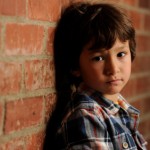Last week, I addressed a concerning issue from one of my readers about helping her children deal with a neighborhood bully. In discussing this very important topic, the heart of the issue cannot be overlooked…how does a child become a bully and why? Today, I’m so very pleased to have Katie from Practical Parenting here to answer this very question and provide invaluable tips on how we can raise empathetic children. Katie is a child, adolescent, and family psychotherapist who I regularly turn to for sage advice and wisdom on child development and parenting. She’s also a fabulous mom of two and regularly shares practical tips, advice, and kid-friendly activities on her blog.
_________________________________
 People often wonder what causes children to bully. Why is it that some children feel the need to hurt and humiliate other children? What do they really stand to gain from this cruel behavior?
People often wonder what causes children to bully. Why is it that some children feel the need to hurt and humiliate other children? What do they really stand to gain from this cruel behavior?
Some studies indicate that some (not all) bullies have naturally aggressive and/or hyperactive personalities from the start. Some. But that doesn’t mean that all “spirited” kids will bully while all “mellow” kids will be perfectly empathic and kind. Those are just a couple of traits that have been identified in some bullies.
The truth is that bullies are not born into this world. Bullies are raised.
Bullying, at its core, is a learned behavior that is used in response to stress. Bullying is an attempt to gain superiority or control over another.
Bullies do tend to have a few things in common:
- Immature social skills
- Lack of compassion and empathy
- Poor impulse control
- Watch more aggressive TV shows and play more aggressive video games
Due to immature social skills, bullies tend to view threats where there are none and identify other kids as hostile when they are not. Accidentally bump into a bully in line at the cafeteria, and a fight might erupt based on a snap judgment. Due to lack of compassion and empathy, bullies have difficulty understanding how others feel and they are unable to accurately decode situations in which other kids are actually attempting to show empathy toward them.
Although it can be difficult to find compassion for a bully, particularly when your child is the target of one, there is generally a reason behind the bullying. That’s not to say that bullies should not face consequences. They should. And zero tolerance is the only way to truly eradicate bullying.
It can be useful, however, to understand some of the reasons why kids become bullies:
- 1. Strained Parental Relationships: Bullies often lack warm, caring, and involved parents. Parents of bullies tend to be highly competitive and place unreasonable demands on their children to be superior to other kids (academically, socially, athletically, etc.). These parents often have prejudices based on race, sex, wealth, and achievements. They teach their children to compete at all costs, and to win by whatever means.
- 2. Inconsistent Discipline: Bullies often lack consistent discipline at home. Their parents tend to have difficulty setting limits and/or struggle to hold them accountable for their behavior.
- 3. Poor Academic Performance: Some kids bully in response to academic stress. When they struggle in the classroom and feel that they are not being helped, they may begin to lose hope. When hope is lost, children act out. This can translate to bullies seeking “revenge” on the higher achieving kids.
- 4. Unsupportive Peer Networks: Children who are isolated and feel disliked or unsupported by peers often turn to bullying to gain some social control. Their distorted thinking causes them to believe that controlling other kids = having friends.
- 5. Child Abuse: There is ample evidence that children who are physically abused by their parents turn around and bully other kids. These same kids are likely to develop anxiety, depression, and drug & alcohol problems and will probably abuse their own kids later in life. Abuse is cyclical.
- 6. Victims of Bullies: Many bullies have actually been victims of bullies at another time. Due to lack of support, poor social skills, and relying on learned behaviors, these kids use bullying behaviors to try to gain superiority and control so that they will no longer be victimized.
- 7. Low Self-Esteem: When you add up all of the possibilities, it should come as no surprise that bullies tend to struggle with self-esteem. The outward behaviors they choose to show mask their true inner feelings. They lack self-confidence, struggle to fit in, and are often ridiculed and marginalized by their own parents and/or siblings.
There are steps we can take to avoid raising bullies. I can’t stress to you enough the importance of building positive relationships with your children. They need to feel loved, supported, and heard by their parents. They will make poor choices at times and fail where we wish they would succeed, but they are our children, and we need to love them anyway.
Below are a few tips to work on building those positive relationships:
- Praise them often. Praise their big accomplishments as well as the little things that make them great every day.
- Listen when they need to be heard.
- Help them problem solve.
- Encourage positive peer relationships.
- Build positive sibling relationships. Avoid comparisons, as this breeds unhealthy competition among siblings.
- Set limits and hold them accountable for their behavior.
- Teach empathy every day.
- Carve out special time with each child and spend that time doing something that you both enjoy.
- Talk often, even when you think they are not listening.
- Stay calm; model appropriate conflict resolution skills.
- Decrease exposure to violent TV, movie, and video content.
- Be present.
There is some good news in all of this. Bullies are not born; bullies are raised. We have the opportunity to raise children who will choose to be empathic, kind, and loyal friends. All we have to do is teach them those skills.
How has bullying touched your life?
Pin It








Thanks for having me today…hope this helps a few other parents out there!
Well said! As a teacher who is using Marcia McEvoy’s Bullying interventions in response to MI’s new legislation on bullying, I will say that true bullies are far and few between. We are seeing a rise in mean and aggressive behavior, but only a few are really bullies. McEvoy has some great stuff for educators out there.
Yes, McEvoy has great info. I think, unfortunately, the reasons behind the behaviors often go unnoticed…which turns mean behavior into bullying behavior over time. I worked in school administration for many years, and often found that to be the case.
Katie, excellent piece! We have a bully at school who seems to fit most of the reasons you give. It is helpful to understand that it is a learned behavior. But, it seems to continue on…it’s been several years and this kid is still at it. Thankfully, he doesn’t bother my son, but he bullies other kids.
That’s so hard, Christina. As someone who was in the trenches dealing with this in a school for many years, I can tell you that it’s a very delicate balance. I’m sorry that the behavior of this child has gone on for so long, clearly the needs aren’t being met. Awareness makes such a big difference. Often these kids need extra structure and help coping with various life stressors. But someone has to recognize that and be willing to help. Consequences alone are just band aids…the real issues need to be addressed.
Great article! I would also like to encourage parents to go to my website at http://www.ABLE-antibullying.org and download a copy of the anti bullying pledge. I have heard from many parents who discuss the pledge over dinner as a family, sign it and place it where their child will see it daily as a reminder. The pledge doesn’t just state that they will not bully, but that they will also be a good ” bystander” and attempt to reach out to those who are victims or targets.
All the best to you,
Mikaela Carson
Miss Kansas Teen America 2012
Thank you for sharing the pledge. Taking an anti-bullying pledge is a great way for families to discuss this very important issue.
And even doing all those things- you can still end up with a child who bullies. It is a journey I never thought I would have to be on- my fear was that my child would be a victim and have to deal with how to handle a bully. Instead, she has been the bully. It’s happened twice- for a few weeks in Kindergarten and a few weeks in 1st grade. It isn’t about low self esteem, it isn’t about an abusive home, she doesn’t have parents with a bad marriage, and we certainly don’t allow any violent TV shows and she never plays video games. People who have known my daughter her entire life were shocked by the things she was doing and saying to other kids. My daughter is a compassionate and generous little girl.
The best answer we could come up with was that it was part of her perfectionist personality. The circumstances under which she turned to bullying were vastly different each year. But she’s always been a child of extremes- if she’s going to make good choices, they are the BEST. And if she’s going to head down the road of bad choices- she’s going to be the Best Bully She Can Be.
What mattered and changed things was our response as her parents. We worked in close cooperation with the schools and adults involved. We would check up on her report each and every day. If there was a single incident of bullying, there were steep consequences at home. Most of our discipline is based in gentle principles. Not when we were dealing with bullying. The main tenet of our family values is kindness and respect- bullying completely violates that.
I guess my point in leaving this very very very long comment is that there is no easy way to sum up who is a bully and who is a victim. Instead, I think we just have to work together to address it immediately. When a child comes home and tells of being bullied, what is the first instinct? To blame the parents of the bully. Thus, we start an immediate “war” between ourselves. Instead, I think we should be working together as a community to face it head on and emphasize the value of kindness and compassion.
Thank you so much for this honest and open comment. We can’t always fit everyone into one particular category, can we? I wonder if it’s different between boys and girls…who will end up bullying and why. Of course, so other factors are at play too as you mentioned…personality and temperament. All I can say is what a wonderful job you are doing with your daughter. You are involved and acting early to help her through these social issues. I can’t imagine it’s easy to be on either side of the issue. Thank you for sharing your story and for helping your child and her friends learn how to be good friends to each other.
And, you are absolutely right, we need to work together as a community and face it head on! So well said. Parents really to need to come together on this one
I’m so sorry you are going through this, but I commend you for taking it seriously and setting those limits. I’ve worked with kids for many, many years, and I can honestly tell you that most parents do not. It’s very hard to hear that your child is bullying another, and you are doing a great job of teaching her other ways to interact.
It is absolutely a community issue and I truly hope you didn’t think this article was about placing blame on parents. The statistics speak for themselves, and I wanted to share some of the reasons that kids bully. While a perfectionist personality technically does fall into the low self-esteem category, there are always other factors at play.
With you by her side, I know your daughter will get through this and learn better ways to be a great friend.
Your main take away here for me is that a bully is not born. I’ve seen it many times – when we’re at a park, or in the mall, or in line somewhere – when a child acts up, or cuts in line, or calls names – which they will do – then is the time for the parent / guardian to respond to the action. Those who do not? The 3 year old who’s “not nice” (the words we tell my boys) will be a 10 year old who’s not nice and a 16 year old who’s not nice.
And I’d like to say to the mother above, who said her daughter has struggled with this – the most important thing you can keep doing is to continue react, to keep trying to figure out the reasons for the behavior. I think you’re doing the right things and hope that your daughter realizes her “lack of perfection” isn’t so bad. It’s those parents who don’t react, or worse don’t even acknowledge the situation, that will end up with a bully {all in my opinion, of course.}
Yes, you are right. The reacting and helping a child through it is the most important part. These behaviors can’t be ignored, even when they are only three. When they are little, they don’t know what to do with those emotions and they are very impulsive…it’s up to us to teach them.
Wonderful post! All parents should read this. Unfortunately, some parents turn a blind eye to their own children’s behavior or don’t recognize it as bad because the kids are doing what they see at home.
[…] take action and try to help take control. A well written post on Dr. Melissa Arca’s website The Making of a Bully provide some valuable insights on why someone becomes a bully and also some preventive steps people […]
As a parent I think one of the best things, we can do to help prevent bullying is set a good example by teaching our kids on ways to manage and resolve arguments with these bullies without the use of violent, in words or in action. I would like to share this link, about a service on how you can protect your children. You might find it interesting: http://safekidzone.com/